★★★½
“Aliens meets The Terminator in a brisk, head-on collision.”
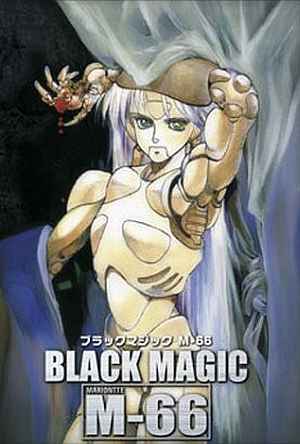 Shirow has certainly done his fair share of anime works that are regarded as classics – his best-known creation is probably Appleseed. This is from relatively early in his career; indeed, coming out in 1991 made it one of the first anime to be ‘properly’ distributed in the West [and, by that, I mean subtitled and not cut down for a child audience]. It centers on the titular pair of military androids, who are released after their transport craft goes down in the middle of a forest. The army cordon off the area, which draws the attention of Sybel (Sakakibara), a reporter, unwilling to let anything stand in the way of her story. She witnesses a hellacious fire-fight in which one ‘droid is destroyed, while the other escapes, and discovers the goal for the android is to kill the inventor’s young grand-daughter, Ferris. As the only person who knows the current location of the daughter, it’s up to her to save the child.
Shirow has certainly done his fair share of anime works that are regarded as classics – his best-known creation is probably Appleseed. This is from relatively early in his career; indeed, coming out in 1991 made it one of the first anime to be ‘properly’ distributed in the West [and, by that, I mean subtitled and not cut down for a child audience]. It centers on the titular pair of military androids, who are released after their transport craft goes down in the middle of a forest. The army cordon off the area, which draws the attention of Sybel (Sakakibara), a reporter, unwilling to let anything stand in the way of her story. She witnesses a hellacious fire-fight in which one ‘droid is destroyed, while the other escapes, and discovers the goal for the android is to kill the inventor’s young grand-daughter, Ferris. As the only person who knows the current location of the daughter, it’s up to her to save the child.
Barely half the length of an average movie, this fairly gallops along, towards an extended climax in a high-rise block, where Sybel is the only thing left standing between the relentless robot and its target. This is when the film is at is best, with action sequences that wouldn’t shame most Hollywood action movies. Less successful – in fact, basically absent (admittedly, no real surprise given the running time) – is any real effort at developing the characters. We know Sybel is focused, because she leaves her apartment with her camera, yet forgets to put on clothes. That’s about the extent of it, and she is the best-served of anyone in the film; Ferris, for instance, does little but squeal in an irritating manner. It’s also a product of its time: originally made in 1987, animation has changed radically in the more than two decades since, and the style now looks somewhat clunky, especially when it tries to simulate camera movement.
Still, the storyline holds up nicely, and given America’s fondness for remaking Japanese genre films, one wonders why they haven’t bothered to mine the animation vaults further [though Speed Racer probably acts as a good counter-argument!]. It’d certainly be very easy to see this as a James Cameron movie.
Dir: Masamune Shirow
Star (voice): Yoshiko Sakakibara, Shinji Ogawa, Yû Mizushima, Chisa Yokoyama





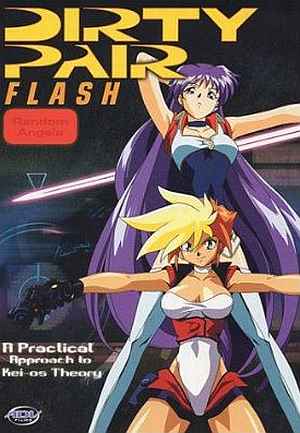 The final – to date – installment of Dirty Pair adventures on the screen, is a bit of a mixed bag. Of the five episodes here, two are pretty good, one mediocre, and two are more than a tad creepy, thanks to the level of, from what I recall of my days in anime, used to be called ‘fan service’. There is an entire episode centered around beach volleyball, which is nothing more than a flimsy excuse to see Kei and Yuri in a variety of miniscule costumes, bordering on the fetishistic. Now, I just don’t find cartoons sexy – no, not even Jessica Rabbit – and given both of them are technically under-age, it all gets a tad sleazy. Things get worse in the fourth episode, when an even younger boy, rich and clever, but very weird, builds a mechanical replica of Yuri and falls in love with it.
The final – to date – installment of Dirty Pair adventures on the screen, is a bit of a mixed bag. Of the five episodes here, two are pretty good, one mediocre, and two are more than a tad creepy, thanks to the level of, from what I recall of my days in anime, used to be called ‘fan service’. There is an entire episode centered around beach volleyball, which is nothing more than a flimsy excuse to see Kei and Yuri in a variety of miniscule costumes, bordering on the fetishistic. Now, I just don’t find cartoons sexy – no, not even Jessica Rabbit – and given both of them are technically under-age, it all gets a tad sleazy. Things get worse in the fourth episode, when an even younger boy, rich and clever, but very weird, builds a mechanical replica of Yuri and falls in love with it.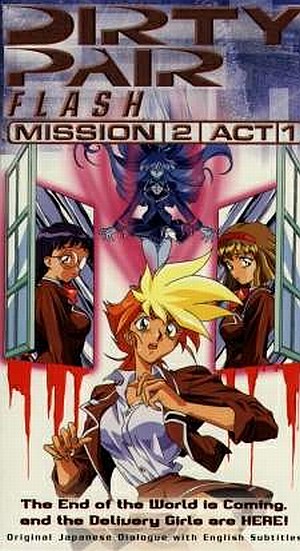 Where are Kei and Yuri, and what have you done with them? That might be the anguished cry of the Dirty Pair fan after watching these five episodes, most of which eschew any efforts at high-octane action, in favour of generally unamusing comedy and tedium. All five parts are set on World’s World, a theme-planet that recreates 20th-century life for tourists. Our heroines are sent there because the computer is virus-infected, to bodyguard the network engineer Touma (Ono) who is going to fix it. Their presence becomes necessary, as it’s soon clear someone is out to stop Touma from doing his job. That only occupies the bookend episodes: the middle three are, while still set on the same planet, largely unconnected. In them, Kei and Yuri must look into ghostly goings-on at a girls’ school, help Touma with his love-life and bring a con-artist to justice.
Where are Kei and Yuri, and what have you done with them? That might be the anguished cry of the Dirty Pair fan after watching these five episodes, most of which eschew any efforts at high-octane action, in favour of generally unamusing comedy and tedium. All five parts are set on World’s World, a theme-planet that recreates 20th-century life for tourists. Our heroines are sent there because the computer is virus-infected, to bodyguard the network engineer Touma (Ono) who is going to fix it. Their presence becomes necessary, as it’s soon clear someone is out to stop Touma from doing his job. That only occupies the bookend episodes: the middle three are, while still set on the same planet, largely unconnected. In them, Kei and Yuri must look into ghostly goings-on at a girls’ school, help Touma with his love-life and bring a con-artist to justice.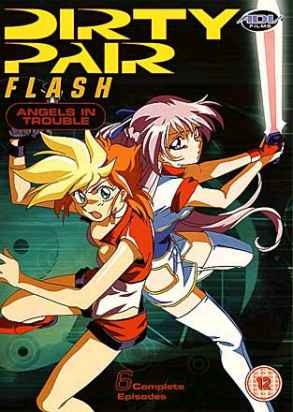 The surprising thing about this, is that the six episodes, basically, form a single plot, a radically different approach to the first phase anime, where the individual OAVs stood on their own, with little or no ongoing story arc. Here, the parts mesh, starting with the pair, off-duty, coming into possession of an encrypted card, which they must get back to 3WA headquarters, in the face of significant opposition. From this develops the uncovering of a galaxy-wide conspiracy involving the malevolent Lucifer group, which must be foiled, since they have control of galactic communications. However, a significant subplot involves Lady Flair, a sniper who humiliates Kei in the second episode, provoking her into a fury which leads, later on, to our redheaded spitfire quitting the 3WA in order to pursue Flair on her own terms.
The surprising thing about this, is that the six episodes, basically, form a single plot, a radically different approach to the first phase anime, where the individual OAVs stood on their own, with little or no ongoing story arc. Here, the parts mesh, starting with the pair, off-duty, coming into possession of an encrypted card, which they must get back to 3WA headquarters, in the face of significant opposition. From this develops the uncovering of a galaxy-wide conspiracy involving the malevolent Lucifer group, which must be foiled, since they have control of galactic communications. However, a significant subplot involves Lady Flair, a sniper who humiliates Kei in the second episode, provoking her into a fury which leads, later on, to our redheaded spitfire quitting the 3WA in order to pursue Flair on her own terms.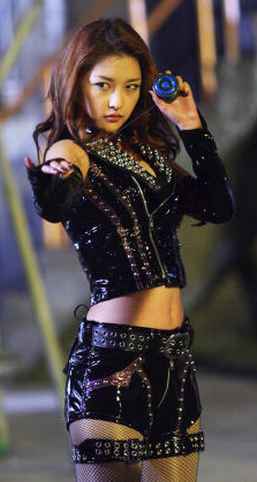
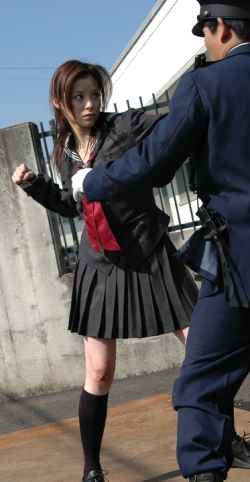 “Yo-yo. Girl. Cop,” said Chris, burdening those three words with sarcasm, as only she can, and giving me one of those sidelong glances, heavy with additional meaning. Hey, what can I say. This was an unexpected revival of the series, from 2006, with the lead played by pop singer Matsura. She is a wild-child coerced into undercover work by Kazutoshi Kira (Takeuchi, from Takashi Miike’s Dead or Alive trilogy), to save her mother who is being held on espionage charges in the US [in a nice touch, Mom is played by Yuki Saito, who was the first live-action Sukeban Deka, in the original TV series]. Her mission – should she choose to accept it – is to go into a high-school and uncover those behind the threatening Enola Gay website, a neo-terrorist URL that now has a counter on it, with less than 72 hours remaining. She befriends Konno Tae (Okada), the meek victim of relentless bullying, and also encounters the school’s queen bee, Reika Akiyama (Rika Ishikawa – shown right, and another pop singer, like Okada part of the v-u-den group) and her clique. Can she work out what’s going down, and pull the plug on it?
“Yo-yo. Girl. Cop,” said Chris, burdening those three words with sarcasm, as only she can, and giving me one of those sidelong glances, heavy with additional meaning. Hey, what can I say. This was an unexpected revival of the series, from 2006, with the lead played by pop singer Matsura. She is a wild-child coerced into undercover work by Kazutoshi Kira (Takeuchi, from Takashi Miike’s Dead or Alive trilogy), to save her mother who is being held on espionage charges in the US [in a nice touch, Mom is played by Yuki Saito, who was the first live-action Sukeban Deka, in the original TV series]. Her mission – should she choose to accept it – is to go into a high-school and uncover those behind the threatening Enola Gay website, a neo-terrorist URL that now has a counter on it, with less than 72 hours remaining. She befriends Konno Tae (Okada), the meek victim of relentless bullying, and also encounters the school’s queen bee, Reika Akiyama (Rika Ishikawa – shown right, and another pop singer, like Okada part of the v-u-den group) and her clique. Can she work out what’s going down, and pull the plug on it?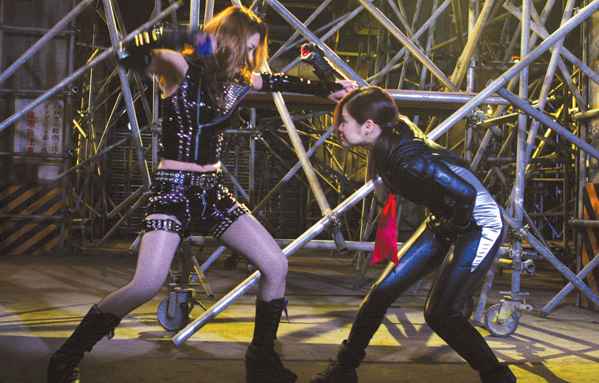
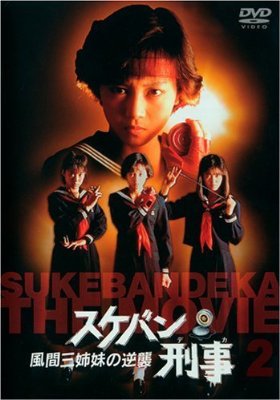 Perhaps the most startling thing here is the amount of political subtext, albeit likely somewhat unintentional. Saki Asamiya (Asaka) is part of the student police force, but feels they are overly brutal, beating anyone who “isn’t a straight arrow”, to quote Asamiya. This leads her to quit, heading off for a spot of slow-motion horse-riding more befitting a feminine hygiene commercial. However, she returns, teaming up with her sisters, when she discovers that her erstwhile colleagues are staging terrorist attacks, and blaming them on a group called the Outcast League, a with the aim of strengthening their position and gaining even greater powers. Asamiya joins the League, only to find the full force of the law now turned on her.
Perhaps the most startling thing here is the amount of political subtext, albeit likely somewhat unintentional. Saki Asamiya (Asaka) is part of the student police force, but feels they are overly brutal, beating anyone who “isn’t a straight arrow”, to quote Asamiya. This leads her to quit, heading off for a spot of slow-motion horse-riding more befitting a feminine hygiene commercial. However, she returns, teaming up with her sisters, when she discovers that her erstwhile colleagues are staging terrorist attacks, and blaming them on a group called the Outcast League, a with the aim of strengthening their position and gaining even greater powers. Asamiya joins the League, only to find the full force of the law now turned on her. This film was made between season two and season three of the television series, and represents a passing of the torch from Saki, SD #2 (Minamino) to SD #3 (Asaka), in preparation for the upcoming TV show. Saki has just about given up her life as a detective, but finds herself dragged in when she, literally, bumps into someone on the street. He turns out to be an escapee from Hell Castle, a reform school for wayward kids on an island near Tokyo, and she discovers that Principal Hattori (Ibu) is training the pupils to be a brainwashed army for an upcoming coup d’etat [the word is exactly the same in Japanese, incidentally]. She goes to her bosses with the information, but the investigation is quickly killed from above, for reasons I’m sure you can guess. So, it’s up to Saki to put together a team, sneak onto the island, rescue the inmates and stop Hattori. He turns out to be a nemesis from the TV show, though that back-story will, for obvious reasons, be lost on the vast majority of Western viewers.
This film was made between season two and season three of the television series, and represents a passing of the torch from Saki, SD #2 (Minamino) to SD #3 (Asaka), in preparation for the upcoming TV show. Saki has just about given up her life as a detective, but finds herself dragged in when she, literally, bumps into someone on the street. He turns out to be an escapee from Hell Castle, a reform school for wayward kids on an island near Tokyo, and she discovers that Principal Hattori (Ibu) is training the pupils to be a brainwashed army for an upcoming coup d’etat [the word is exactly the same in Japanese, incidentally]. She goes to her bosses with the information, but the investigation is quickly killed from above, for reasons I’m sure you can guess. So, it’s up to Saki to put together a team, sneak onto the island, rescue the inmates and stop Hattori. He turns out to be a nemesis from the TV show, though that back-story will, for obvious reasons, be lost on the vast majority of Western viewers.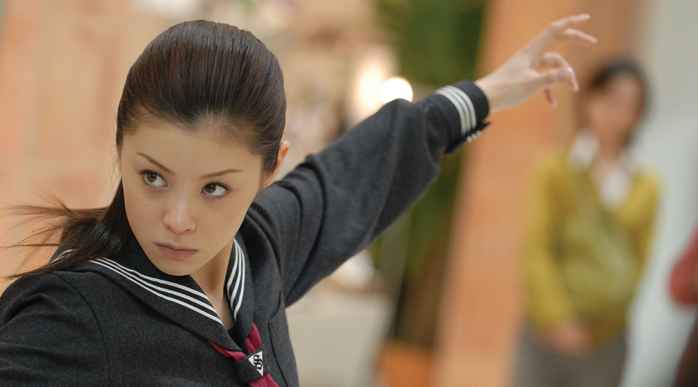
 Rarely has the phrase, “Only in Japan,” ever been more appropriate. It’s not just the notion of a delinquent schoolgirl, taken in by the government and turned into a secret-agent of sorts. That, alone, is odd, but not particularly memorable. No, it’s that her weapon of choice is a
Rarely has the phrase, “Only in Japan,” ever been more appropriate. It’s not just the notion of a delinquent schoolgirl, taken in by the government and turned into a secret-agent of sorts. That, alone, is odd, but not particularly memorable. No, it’s that her weapon of choice is a 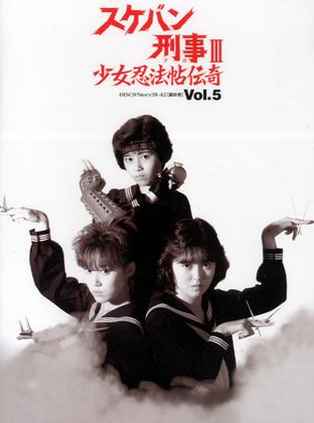 This appears to be episodes 34-36 of the second series, and having watched them, I feel I can convincingly state, with little fear of contradiction, that I have little or no idea what is going on. #34 takes place mostly in the woods, with Saki apparently possessed by something that causes her to attack her friends. Also roaming the woods is a samurai, and another schoolgirl, who possesses fangs, and leaps to the attack accompanied by cat noises. There is a fair amount of largely-unconvincing fighting, ending when Saki has her memory jogged by a small trinket, apparently breaking the curse placed upon her. To say any more would probably be…unwise.
This appears to be episodes 34-36 of the second series, and having watched them, I feel I can convincingly state, with little fear of contradiction, that I have little or no idea what is going on. #34 takes place mostly in the woods, with Saki apparently possessed by something that causes her to attack her friends. Also roaming the woods is a samurai, and another schoolgirl, who possesses fangs, and leaps to the attack accompanied by cat noises. There is a fair amount of largely-unconvincing fighting, ending when Saki has her memory jogged by a small trinket, apparently breaking the curse placed upon her. To say any more would probably be…unwise.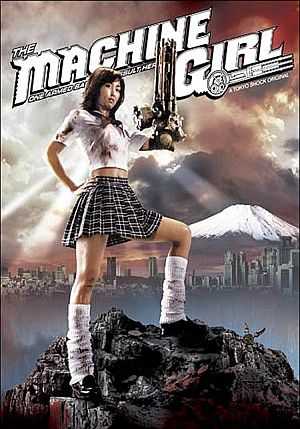
 If you enjoyed Planet Terror, you’ll likely get a kick out of this, which also combines elements of The Evil Dead, Kill Bill and Tetsuo the Iron Man into what has got to be the bloodiest movie of 2008. The life of Ami (Yashiro) is turned upside down when her brother and his friend are killed by school bullies under the control of a local gangster’s son (Nishihara). Ami sets out for revenge on all those responsible for the killings. But the Yakuza don’t take kindly to this and Ami finds herself with a count of functioning limbs that ends at three. Does that stop her? Of course not. Teaming up with the late friend’s mother Miki (Asami), whose husband happens to be an ace mechanic, Ami gets fitted with a machine-gun and the pair of vengeful vixens head off for a return match.
If you enjoyed Planet Terror, you’ll likely get a kick out of this, which also combines elements of The Evil Dead, Kill Bill and Tetsuo the Iron Man into what has got to be the bloodiest movie of 2008. The life of Ami (Yashiro) is turned upside down when her brother and his friend are killed by school bullies under the control of a local gangster’s son (Nishihara). Ami sets out for revenge on all those responsible for the killings. But the Yakuza don’t take kindly to this and Ami finds herself with a count of functioning limbs that ends at three. Does that stop her? Of course not. Teaming up with the late friend’s mother Miki (Asami), whose husband happens to be an ace mechanic, Ami gets fitted with a machine-gun and the pair of vengeful vixens head off for a return match.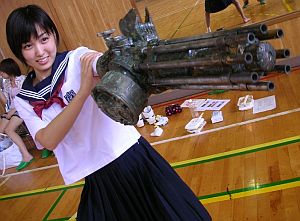 Yashiro’s background is in…well, what could politely be described as ‘bikini videos’, not action movies, but her performance here is respectable enough. Probably more impressive are Asami, and Honoka, who plays the wife of the Yakuza boss. They both, too, come from the adult industry, possessing an impressive feral intensity which reminded me of Brigitte Lahaie in Fascination, and is entirely in keeping with the grindhouse feel of the entire enterprise. You could argue that the trailer contains everything you need to see, in a more concentrated form, and I wouldn’t argue with that, or if you said this was no more than a porn variant, where nothing matters except the money shots of body fluids getting sprayed everywhere. Still, we had a blast, and the film fully lives up to the sleeve description, delivering the “One-Armed Ballistic Assault Heroine” it promises, in spades.
Yashiro’s background is in…well, what could politely be described as ‘bikini videos’, not action movies, but her performance here is respectable enough. Probably more impressive are Asami, and Honoka, who plays the wife of the Yakuza boss. They both, too, come from the adult industry, possessing an impressive feral intensity which reminded me of Brigitte Lahaie in Fascination, and is entirely in keeping with the grindhouse feel of the entire enterprise. You could argue that the trailer contains everything you need to see, in a more concentrated form, and I wouldn’t argue with that, or if you said this was no more than a porn variant, where nothing matters except the money shots of body fluids getting sprayed everywhere. Still, we had a blast, and the film fully lives up to the sleeve description, delivering the “One-Armed Ballistic Assault Heroine” it promises, in spades.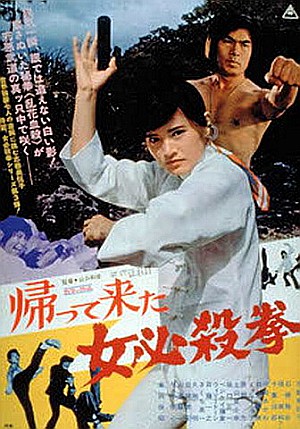 The third in the series loses a lot of the loopy insanity that made the first one such a classic. Shiomi is still as kick-ass a heroine as ever, but I have to say, it was a severe struggle to remain conscious throughout, despite the brief 77-minute running time. By most accounts, the story is largely a re-tread of the second film, with Koryu Lee (Shiomi) going from Hong Kong to Yokohama, to track down a missing woman, only to find herself crossing paths, swords and a variety of other weapons, with local organized crime – since the target of her search is now the mistress of Oh Ryu Mei (Yamamoto). He pits wannabe warriors against each others in death matches, to decide who is fit to become a minion, only to find Lee is more than up to taking them on. He turns to freelancer Kurosaki (Kurata), who agrees to take out the unwanted snooper for twenty million yen.
The third in the series loses a lot of the loopy insanity that made the first one such a classic. Shiomi is still as kick-ass a heroine as ever, but I have to say, it was a severe struggle to remain conscious throughout, despite the brief 77-minute running time. By most accounts, the story is largely a re-tread of the second film, with Koryu Lee (Shiomi) going from Hong Kong to Yokohama, to track down a missing woman, only to find herself crossing paths, swords and a variety of other weapons, with local organized crime – since the target of her search is now the mistress of Oh Ryu Mei (Yamamoto). He pits wannabe warriors against each others in death matches, to decide who is fit to become a minion, only to find Lee is more than up to taking them on. He turns to freelancer Kurosaki (Kurata), who agrees to take out the unwanted snooper for twenty million yen.